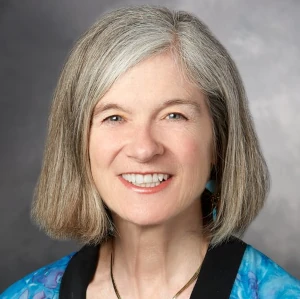Session Abstract – PMWC 2024 Silicon Valley
Track Co-Chairs:
Yoel Sadovsky, UPMC
C. Noel Bairey Merz, Cedars-Sinai Medical Center
The Women's Health Track with a focus on sex differences aims to explore the latest research in this field and highlight the importance of sex-specific analysis in healthcare. The full-day track includes sessions on enhancing women's health research, general sex differences in large studies, pregnancy (Feto-placental) and sex differences, the biology underlying sex differences, and systems and sex differences. The confirmed speakers are leading experts in their respective fields, including cardiovascular medicine, immunology and virology, metabolic disease, Alzheimer's disease, autism, diabetes, exercise, and hypertension. Through this track, attendees will gain valuable insights into the latest research on sex differences in healthcare and the importance of personalized medicine for women.
- PMWC 2024 Award Ceremony
Pioneer Honoree: David Page, MIT
Luminary Honoree: Janine Austin Clayton, NIH
- Keynote: Enhancing Women's Health Research
- Janine Austin Clayton, NIH
- Keynote: Inclusive Research for Better Health: The FDA's Perspective on Sex Differences in Clinical Trials
- Kaveeta Vasisht, FDA
- Keynote: The Chromosomal Basis of Sex Differences in Health and Disease
- David Page, Whitehead Institute
- General Sex Differences in Large Studies
Chair: Karen Reue, UCLA (Sex Differences in Metabolic Disease)
- Franck Mauvis-Jarvis, Tulane University (Sex Differences in Insulin Resistance) - Feto-placental Sex Differences
Chair: Yoel Sadovsky, University of Pittsburgh
- Nima Aghaeepour, Stanford (AI Taxonomy for Reproductive Health)
- Leslie Myatt, OHSU Oregon (Fetal Sex and Pregnancy Outcomes)
- Systems and Sex Differences
Chair: Marcia Stefanick, Stanford (Sex differences in Cancer)
- Judy Regensteiner, University of Colorado (Sex and Gender: Focus on Diabetes)
- Monica Gandhi, UCSF (Sex Differences in HIV) - Cardiovascular Sex Differences
- Martha Gulati, Cedars Sinai - Sex Differences in Alzheimer's Disease
Chair: Marina Sirota, UCSF (Sex Differences in Alzheimer's Disease Using Clinical, Molecular, and Computational Approaches)
- Sarah Banks, UCSD (Sex Differences in Tau Pathology and AD Modifiable Risk)
- Roberta Brinton, University of Arizona (Illuminating Path to Alzheimer's Cure) - Sex Differences and Cognitive-behavioral Function
Chair: Debra Kaysen, Stanford (Gender Effects on Trauma Exposure, PTSD, and Treatment)
Speaker Profile
Biography
Dr. Sadovsky is the Executive Director of Magee Women's Research Institute, the Elsie Hilliard Hillman Chair of Women's Health Research, Distinguished Professor of OBGYN, Microbiology and Molecular Genetics, and Associate Dean, Women's Health Research and Reproductive Sciences, University of Pittsburgh. He is board certified in obstetrics and gynecology (Washington University), and maternal-fetal medicine (UCSF). His NIH-funded research focuses on feto-placental development and molecular mechanisms underlying placental function, aiming to better understand early human development and pregnancy health. He is a member of the National Academy of Medicine and the Association of American Physicians. He has served as president of the Society for Reproductive Investigation, on the Councils for NIHNICHD and the March of Dimes, and currently serves on the NIH Advisory Committee on Research in Women’s Health. In 2013, he was awarded the Cozzarelli Prize in Biomedical Science from the National Academy of Sciences.
Speaker Profile
Biography
Dr. Leslie Myatt applies basic science methodologies to understand the etiology of the major clinical problems in perinatology and develop novel therapeutic approaches. He has published over 300 papers and has served on many review panels for NIH, CIHR and other international grant giving bodies. His current work studies 1. The effects of maternal obesity, gestational diabetes and sexual dimorphism on mitochondrial respiration in the placenta and their relationship to epigenetic regulation of placental function and the Developmental Origins of Health and Disease (DOHaD) and 2. Autocrine-paracrine mechanisms in fetal membranes involved in parturition. Dr. Myatt has served as Editor of the journal Placenta, and as President of the Perinatal Research Society, the International Federation of Placenta Associations and the Society for Gynecologic Investigation. He was presented with the Naftolin Award for Mentorship and the Distinguished Scientist Award by the Society for Reproductive Investigation.
Talk
Fetal Sex Influences Pregnancy and Longterm Outcomes
In utero exposures (stress, toxins, nutritional) epigenetically program the fetus for subsequent development of disease. The male fetus is at greater risk of adverse pregnancy outcomes including stillbirth with sexual dimorphism in placental function. Different therapeutic approaches may be needed for pregnancies with a male vs a female fetus.
Speaker Profile
Biography
Dr. Roberta Diaz Brinton leads the Center for Innovation in Brain Science, a university research biotech ecosystem devoted to therapeutic development for Alzheimer's, Parkinson's, Multiple Sclerosis, and ALS. She is the University of Arizona Regents Professor of Pharmacology, Neuroscience and Neurology. Her research spans discovery, translational, and clinical science which has led to over 250 scientific publications, 5 NIH clinical trials, multiple patents, and 2 biotech startups, most recently, NeuTherapeutics. She is an internationally recognized Alzheimer's expert on mechanistic drivers of the disease and sex differences. She is currently conducting three National Institute on Aging clinical trials, including the REGENBRAIN trial to regenerate the Alzheimer's brain. Brinton serves on the NIH Advisory Committee to the Director, NIA Scientific Advisory Board and Alzheimer's Drug Discovery Foundation Board of Governors. Her honors include the ADDF Scientist of the Year, Goodes Prize for Alzheimer's Drug Discovery, and the U.S. Presidential Citizens Medal for STEM education.
Talk
Hormone Therapy and Implications for Alzheimer's Disease
Speaker Profile
Biography
Dr. Janine Austin Clayton, is an influential figure in women's health research. Since 2012, Dr. Clayton has been advocating the study of diseases and conditions primarily affecting women. A key player in establishing the NIH policy that requires consideration of sex as a biological variable in all research, she has improved reproducibility, rigor, and transparency in scientific studies. She also cochairs the NIH Working Group on Women in Biomedical Careers and is part of the American Association for the Advancement of Science (AAAS) Board of Directors since 2021. Prior to her work at the NIH, she was Deputy Clinical Director of the National Eye Institute (NEI), demonstrating expertise as an ophthalmologist focusing on autoimmune ocular diseases and the impact of sex and gender on health. A Washington D.C. native, Dr. Clayton graduated with honors from Johns Hopkins University and received her medical degree from Howard University College of Medicine.
Speaker Profile
Biography
Nima Aghaeepour is an Associate Professor at Stanford University. His laboratory develops machine learning and artificial intelligence methods to study clinical and biological modalities in translational settings. He is primarily interested in leveraging multiomics studies, wearable devices, and electronic health records to address global health challenges. His work is recognized by awards from numerous national and international organizations including the Bill and Melinda Gates Foundation, the Alfred E. Mann Foundation, the March of Dimes Foundation, the Burroughs Wellcome Fund, and the National Institute of General Medical Sciences.
Talk
An AI-Driven Taxonomy for Reproductive, Maternal, and Child Health
This talk will discuss a series of studies using stateoftheart biological profiling, electronic health records, and artificial intelligence techniques which aim to enable an integrated precisionmedicine approach to predict, prevent, and manage complications related to reproductive health, pregnancy, and newborn health.
Speaker Profile
Biography
Dr. Sarah Banks is a Clinical Neuropsychologist and researcher whose focus is on sex differences in Alzheimer's disease (AD). Alzheimer's differs between the sexes in both how it is expressed and in risk factors. Her focus is on finding ways to diagnose AD earlier in men and women, and design precision interventions. A native of London, UK, she went to the University of Edinburgh where she discovered her passion for Neuropsychology. After working in Oxford she migrated to the USA for graduate school at Northwestern University Feinberg School of Medicine in Chicago. She went on to do a predoctoral internship at the University of Chicago, then a postdoctoral fellowship at the Montreal Neurological Institute. She was recruited to develop a clinical and research program at the Cleveland Clinic's Lou Ruvo Center for Brain Health where she expanded her work on sex differences in Alzheimer's disease. She is now faculty at UC San Diego.
Talk
Tau Pathology and Modifiable Risk in AD: Sex Differences
Men and women differ in pathological aspects of Alzheimer's disease, and also how risk is manifested. These two important sex differences will be pivotal to understand if we are to develop interventions that work in women, who account for 23 of cases of Alzheimer's in the USA.
Speaker Profile
Biography
Dr. Regensteiner is Director of the Ludeman Family Center for Women's Health Research. Her research expertise is in the cardiovascular effects of diabetes with a specific focus on women with type 2 diabetes. Her lab has been funded for over 30 years and her more than 180 publications have influenced the field. She is a Principal Investigator for the National Institutes of Health's Building Interdisciplinary Research Careers in Women's Health (BIRCWH) grant and the Doris Duke Foundation's Fund to Retain Clinical Scientists as well as a Principal Investigator on a NIH RO1 for her research on the cardiovascular consequences of type 2 diabetes. She is on the Advisory Committee for the NIH's Office of Research on Women's Health. She is also an alumna of the Executive Leadership in Academic Medicine Program (ELAM) and is on the steering committee of the national Leaders in Women's Health group.
Talk
Sex and Gender: Focus on Diabetes
Type 2 diabetes confers an increased risk of cardiovascular (CV) disease. CV effects in women may be even more severe than in men. However, little is known about sex and gender differences in CV risks of diabetes. Our research examines sex differences in CV exercise outcomes which may indicate the earliest evidence of heart disease.
Speaker Profile
Biography
In 1979, David Page became the first student anywhere in the world to work on what would become the Human Genome Project. He joined the Whitehead Institute for Biomedical Research at its opening in 1984, as the first Whitehead Fellow, and has been a member of its faculty since 1988. He served as Whitehead's fourth and longest serving Director and President, from 2004 to 2020. Page is also a Professor of Biology at MIT and an Investigator of the Howard Hughes Medical Institute. A graduate of Swarthmore College, Page earned his MD from Harvard Medical School and the Harvard MIT Health Sciences and Technology program. Page's laboratory explores biological differences between males and females in health and disease, both within and beyond the reproductive tract. The Page lab recently discovered that XY and XX sex chromosomes account for subtle differences in the molecular biology of male and female cells throughout the body. Page's honors include a MacArthur Prize Fellowship, Science Magazine's Top Ten Scientific Advances of the Year (1992 and 2003), the Francis Amory Prize of the American Academy of Arts and Sciences, and the March of Dimes Prize in Developmental Biology. He is a Member of the National Academy of Sciences, the National Academy of Medicine, and the American Academy of Arts and Sciences.
Speaker Profile
Biography
Dr. Janine Austin Clayton, is an influential figure in women's health research. Since 2012, Dr. Clayton has been advocating the study of diseases and conditions primarily affecting women. A key player in establishing the NIH policy that requires consideration of sex as a biological variable in all research, she has improved reproducibility, rigor, and transparency in scientific studies. She also cochairs the NIH Working Group on Women in Biomedical Careers and is part of the American Association for the Advancement of Science (AAAS) Board of Directors since 2021. Prior to her work at the NIH, she was Deputy Clinical Director of the National Eye Institute (NEI), demonstrating expertise as an ophthalmologist focusing on autoimmune ocular diseases and the impact of sex and gender on health. A Washington D.C. native, Dr. Clayton graduated with honors from Johns Hopkins University and received her medical degree from Howard University College of Medicine.
Speaker Profile
Biography
Dr. Stefanick's research, which has been widely disseminated nationally and internationally, has emphasized the role of lifestyle, especially exercise, diet, weight control, and menopausal hormone therapy on chronic disease prevention, particularly heart disease, breast cancer, osteoporosis, and more recently, dementia. Her primary academic interests include sex-gender differences and the influence of sex hormones on human physiology and disease, menopause, and health promotion over the life course, including healthy aging. She offers courses on these subjects at Stanford, where she plays major leadership roles in the Women's Health at Stanford program, the Cardiovascular Institute's Women's Heart Health Program, and the Cancer Prevention and Control Program of the Stanford Cancer Center.
Talk
Sex Differences in Cancer
Speaker Profile
Biography
Marina is an Associate Professor at the Bakar Computational Health Sciences Institute at UCSF. Prior to that she was a Senior Research Scientist at Pfizer after getting her PhD in Biomedical Informatics at Stanford. Dr. Sirotas research experience spans over 10 years during which she has co authored over 100 scientific publications. Her research interests lie in developing computational integrative methods and applying these approaches in the context of disease diagnostics and therapeutics. The Sirota laboratory is funded by NIA, NLM, NIAMS, March of Dimes and the Burroughs Wellcome Fund. As a young leader in the field, she has been awarded the AMIA Young Investigator Award in 2017. Dr. Sirota also is the director of the AI4ALL program at UCSF, with the goal of introducing high school girls to applications of AI in biomedicine and serves as the director of outreach and advocacy at the Bakar Computational Health Sciences Institute.
Talk
Unlocking the Secrets of Sex Differences in AD
Speaker Profile
Biography
In 1979, David Page became the first student anywhere in the world to work on what would become the Human Genome Project. He joined the Whitehead Institute for Biomedical Research at its opening in 1984, as the first Whitehead Fellow, and has been a member of its faculty since 1988. He served as Whitehead's fourth and longest serving Director and President, from 2004 to 2020. Page is also a Professor of Biology at MIT and an Investigator of the Howard Hughes Medical Institute. A graduate of Swarthmore College, Page earned his MD from Harvard Medical School and the Harvard MIT Health Sciences and Technology program. Page's laboratory explores biological differences between males and females in health and disease, both within and beyond the reproductive tract. The Page lab recently discovered that XY and XX sex chromosomes account for subtle differences in the molecular biology of male and female cells throughout the body. Page's honors include a MacArthur Prize Fellowship, Science Magazine's Top Ten Scientific Advances of the Year (1992 and 2003), the Francis Amory Prize of the American Academy of Arts and Sciences, and the March of Dimes Prize in Developmental Biology. He is a Member of the National Academy of Sciences, the National Academy of Medicine, and the American Academy of Arts and Sciences.
Speaker Profile
Biography
The Reue laboratory seeks to identify genes, pathways, and the role of sex in the development of traits underlying the Metabolic Syndrome, including obesity, dyslipidemia, and insulin resistance. Using genetic manipulation in mouse models, this research has revealed independent roles for gonadal hormones and sex chromosomes in dietary lipid absorption, regulation of circulating lipid levels, development of adipose tissue, mitochondrial function, and statin related diabetes.
Talk
Sex Differences In Metabolic Disease
The prevalence and presentation of cardiometabolic diseases is sexbiased. Studies that dissociate chromosomal sex (XX vs. XY) and gonadal sex (ovaries vs. testes) have uncovered mechanisms for sexbiased gene regulation in conditions such as obesity, atherosclerosis, autoimmune disease and Alzheimers disease. This information may inform sexspecific disease prevention and treatment.
Speaker Profile
Biography
Dr. Mauvais-Jarvis is a Professor of Medicine and Director of the Tulane Diabetes Research Program at Tulane University School of Medicine. He is also the Chief of Endocrinology, Diabetes, and Metabolism at the Southeast Louisiana Veterans Health Care System. He has a strong interest in women's health, particularly in the areas of diabetes and obesity. His research has focused on understanding the mechanisms underlying sex differences in the development and progression of these diseases, as well as identifying novel therapeutic targets. Dr. Mauvais-Jarvis has received several awards for his research contributions, including being named a Fellow of the American Association for the Advancement of Science, receiving the Outstanding Scientific Achievement Award from the American Diabetes Association, and the Endocrine Society's Clinical Investigator Award.
Talk
Sex Differences in Diabetes and Metabolism
The presentation will discuss major sex differences in the regulation of glucose and energy homeostasis and the development of type 2 diabetes
Speaker Profile
Biography
Dr. Monica Gandhi is an expert in infectious diseases, specializing particularly in the care of patients with HIV and AIDS. In her research, Gandhi has a special interest in HIV in women, including differences between women and men in exposure to antiretroviral medication and responses to therapy. Her work on these subjects has been widely published. Gandhi earned her medical degree at Harvard Medical School. At UCSF, she completed an internal medicine residency and infectious diseases fellowship, as well as a postdoctoral fellowship at the Center for AIDS Prevention Studies. During her infectious diseases fellowship, she earned a master of public health degree in epidemiology and biostatistics at the University of California, Berkeley. Gandhi has received many awards, including one from the National Institutes of Healths Building Interdisciplinary Research Careers in Women's Health program and an early career faculty award from the Hellman Fellows Program.
Talk
Sex Differences in HIV
Speaker Profile
Biography
Martha Gulati is the President of the American Society for Preventive Cardiology. She recently joined the Cedars Sinai Heart Institute as a professor of cardiology and is the director of prevention, the associate director of the Barbra Streisand Women's Heart Center and holds the Anita Dann Friedman Endowed Chair in Women’s Cardiovascular Medicine and Research. She is the author of the bestseller, Saving Womens Hearts. She served as the chair of the national chest pain guidelines from the American Heart Association and the American College of Cardiology, which were released in 2021. Dr. Gulati is Canadian and completed medical school at the University of Toronto, Canada. She went on to complete her internship, residency and cardiology fellowship at the University of Chicago.
Talk
Sex Differences in Cardiovascular Disease
This talk will address the persistent sexspecific gaps found in guidelines, recommendations and prevention of cardiovascular disease strategies for women, and recognize lack of inclusion of women in clinical trials
Speaker Profile
Biography
Dr. Kaveeta Vasisht is the Associate Commissioner for Women’s Health at the US Food and Drug Administration (FDA). She also directs the FDA Office of Women’s Health (OWH), which serves to protect and advance the health of women through policy development, scientific programs, research, education, collaboration, and outreach. Dr. Vasisht leads efforts to advance regulatory science through understanding sex differences, promoting the inclusion of women and diversity in clinical trials, developing educational resources, and establishing women’s health research priorities at FDA. OWH works to bridge knowledge gaps on conditions that uniquely or disproportionately impact women, including pregnancy and lactation. Dr. Vasisht is board-certified in internal medicine and adult endocrinology. She completed her internal medicine residency and endocrinology fellowship at the University of Chicago Hospitals, where she also served on faculty. Dr. Vasisht’s recognitions include the 2023 Health Public Service Visionary Award from the Society for Women’s Health Research.






































